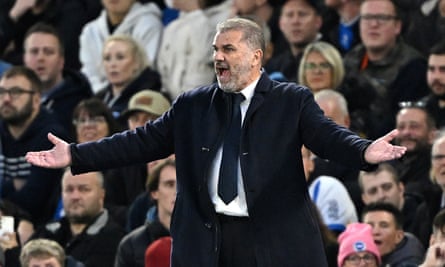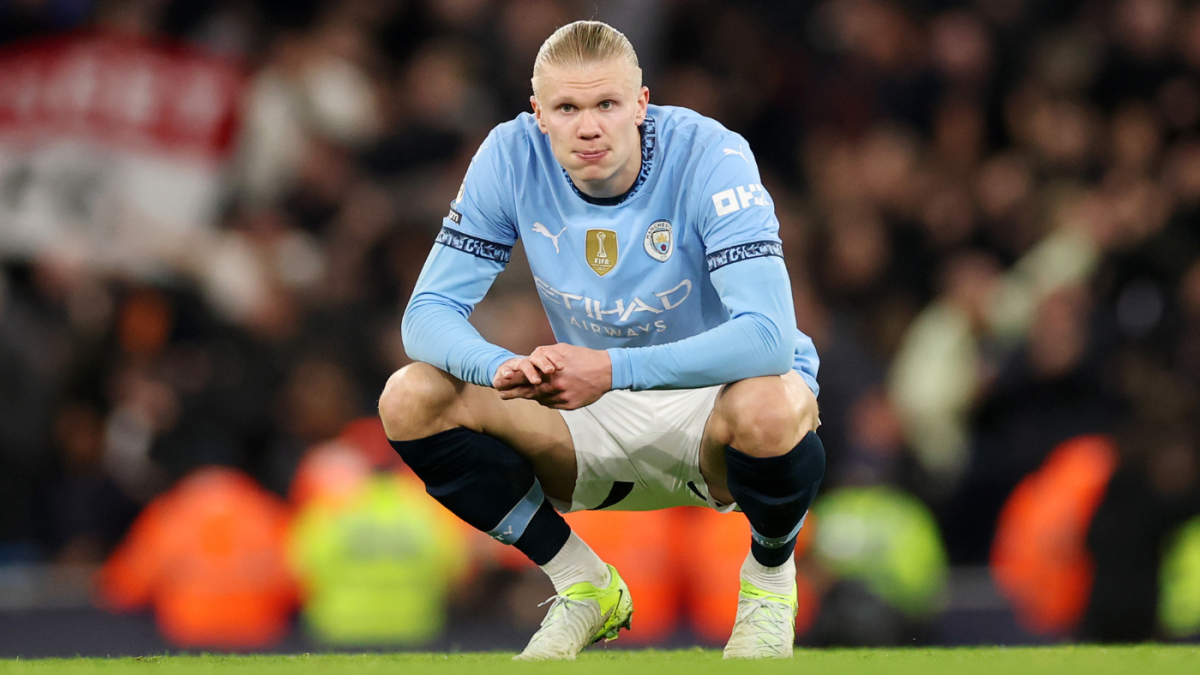 Champions League
Champions League

 Conference League
Conference League

 Premier League
Premier League

Published on Oct, 06 2024

If only there were a word for that sort of performance from Tottenham.
At half-time, they were 2-0 up and seemed utterly in control, Dejan
Kulusevski and Brennan Johnson ripping Brighton apart down the right.
They were so dominant that the instinct was to start recalling great
Spurs collapses of the past – 3-0 up against Manchester United in
2001, 3-0 up against 10-man Manchester City in 2004, the leads lost
in the two 5-2 defeats by Arsenal in 2012, 2-0 up against Chelsea in
the Battle of the Bridge in 2016, 3-0 up after 82 minutes against West
Ham in 2020 – if only because it seemed so unlikely something similar
could happen again. But the Spursiness of Spurs is never to be underestimated.
This was the 10th time Spurs have lost a Premier League game having
been two goals up. No other side have done it on more than seven
occasions. As Giorgio Chiellini observed after Juventus had scored
twice in three second-half minutes to transform a Champions League tie
Spurs had seemed to be dominating in 2018, “this is the history of the
Tottenham”.
Perhaps in retrospect, there were just a couple of warning signs in
the first half, the sense that Brighton had the capacity to slice
Spurs open. But the story at the break seemed to be of Brighton’s
fragility, the remarkable vulnerability of their high line. There was
the unusual sensation of watching a dogmatic approach being undone in
a Spurs game and Ange Postecoglou being on the right side of it.
The tone was set within 16 seconds as Dominic Solanke released Timo
Werner behind Joël Veltman; again and again the away side hit the
space Chelsea had exploited last week. Fabian Hürzeler has insisted
the issue is not the height of the line but a lack of pressure on the
ball, but playing a line that high with players as slow on the turn as
Lewis Dunk and Adam Webster means there is no failsafe such as, for
instance, Spurs enjoy with the pace of Micky van de Ven. The loss of
Webster to what appeared a hamstring injury after nine minutes only
complicated matters further. Igor Julio came on, but Jan Paul van
Hecke is badly missed.

Ange Postecoglou was shocked by Tottenham’s capitulation against Brighton. Photograph: Mike Hewitt/Getty Images
Even allowing for the fact that Werner is not, it’s fair to say, as
lethal as Cole Palmer, the surprise was that it took 23 minutes for
Spurs to take the lead. The method, though, was entirely predictable,
as Georginio Rutter was dispossessed and Solanke fed Johnson to score
his sixth in six games. The second, similarly, resulted from a simple
transition, Solanke holding off Igor to play in Werner, who teed up
James Maddison.
Spurs could have got more before the break. As Postecoglou said, Spurs
should have “put the game to bed”. He seemed almost shell-shocked
afterwards, standing on the pitch for a lengthy period and then
acknowledging that his side hadn’t done the basics, that they hadn’t
competed after half-time. It wasn’t just that they were open in the
second half, it was that the life went out of them. Had more than
three of this side played away to Ferencvaros on Thursday, it might
have been tempting to blame fatigue, but there were no obvious
explanations and, from Postecoglou’s point of view, no excuses.
After a promising start to the season, Brighton had run into a
slightly stick spell, failing to win any of their previous four league
games. There have now been 20 goals in their last four games in all
competitions; that might not be sustainable, but it is fun. Pervis
Estupiñán’s arrival for Ferdi Kalioglu at left-back helped shore up
that side and, with a more solid platform, Kauro Mitoma suddenly was
able to impose himself.
Still, though, for all that Brighton improved, for all that they
became more compact, for all the determined running of Rutter and the
aerial threat of Danny Welbeck, it was hard to avoid the feeling that
Tottenham gave this up. The first Brighton goal came after an air shot
by Van de Van and a miskick by Destiny Udogie. The second came after
Mitoma was allowed a run and Udogie’s shove almost seemed to give
Rutter the momentum to get past Van de Ven. And the third resulted
from Rutter beating Udogie far too easily and Rodrigo Bentancur then
being indecisive, allowing Rutter to cross.
Brighton deserve credit, of course, but this was about Spurs’
collapse. Postecoglou said he’d seen nothing like this from his side
before, but there had been elements of similar wastefulness against
Leicester and Newcastle, games in which Spurs were the better
side for significant periods but failed to win. And that, perhaps, is
the true curse of Spursiness, the sense that there are always three
teams on the pitch: Spurs, their opponents, and the demons of their
worse natures.
Editors Top Picks







